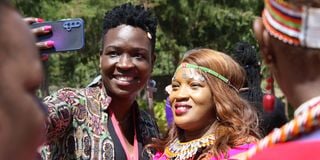Call to change law on public participation

National Gender and Equality Commission CEO Betty Sungura takes a selfie with Winnie Obure during the seventh National Indigenous Women Conference at Anka resort in Nyeri county on July 12, 2022.
Civil society organisations have accused governors of failing to adopt appropriate structures and mechanisms to ensure full participation of citizens in decision-making and have proposed amendments to the law governing the process.
Under the Indigenous Women Council, the leaders from community-based organisations in 14 counties noted that public participation had become a manipulative process where a few people are invited and paid allowances to rubber-stamp what the executive had already decided.
“In most of the counties, we do not have an inclusive public participation process but … private-public participation where a few known people are handpicked to either approve a legislative process or to give a green light to an already identified development project,” Ms Lavenda Achieng’, from Migori County, told an indigenous women’s conference at a Nyeri hotel.
The conference was attended by representatives from 16 indigenous groups from the Northern, Rift Valley, Coast and Western regions under the theme “enhancing indigenous women’s meaningful participation in politics, land and natural resources decision making process”.
Public participation is enshrined in the Constitution as one of the national principles and values of governance. Article 174c identifies the process as one of the key objectives of devolution that gives the powers of self-governance to the people and enhances their participation in decisions affecting them.
But the indigenous women, in one resolution adopted during the two-days conference argued that women from patriarchal societies in arid and semi-arid regions continued to be sidelined when key decisions affecting them were made by county governments.
“In most pastoralist communities, women are not allowed to speak in the presence of men, hence those charged with mobilisation leave the women out and in case a woman appears, she is never given a chance to make her contribution in the men-controlled gatherings,” said Ms Christine Kandie, from Baringo County.
Ms Kandie cited an agreement signed in 2018 between the Baringo County government and the Northern Rangelands Trust (NRT) to hive off hundred acres of land for wildlife conservation without the community being fully involved.
In their resolutions read by Ms Fanis Inganga, from Trust for Indigenous Culture and Health (TICAH), the women called for changes to the law on public participation so as to take the process to villages with more money allocated to it.
Most counties are yet to decentralise the process to have village administrators as the lowest part of county administrative hierarchies.
“At one time, we asked for decentralisation of public participation to the villages but we were told the budget set for the process catered [for proceedings] up to the ward level,” Ms Regina Kimeno, from Elgeyo Marakwet County.
“There is a need to have a caucus at the village level to collect views and prepare a memorandum that can be presented at the ward-level meetings.”
The seventh indigenous conference was organised by the Samburu Women Trust, Defenders Coalition and TICAH. Participants came from minority communities including the Ogiek, Yiaku, Eldorois, Oromo, Pokot Yiaku, Watta and Rendile.





